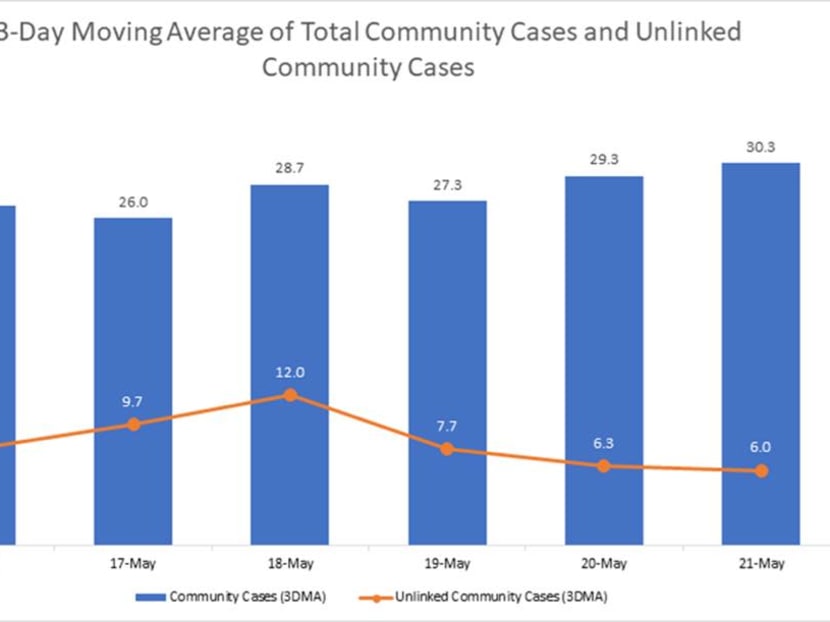3-day moving average number of Covid-19 cases stable for past week, situation not as bad as some fear: Ong Ye Kung
SINGAPORE — There have been public concerns that the Covid-19 situation may be escalating here given the mass testing exercises for residents of two public housing blocks, but Health Minister Ong Ye Kung sought to assure Singaporeans that it was not. He pointed out that the number of coronavirus cases has hovered around the same level since last Sunday.

Residents of Block 559, Pasir Ris Street 51, queueing at the former Coral Primary School on May 23, 2021, to get tested for Covid-19.
- Health Minister Ong Ye Kung said that the Covid-19 situation is “not quite” bad in Singapore
- The three-day moving average number of cases has hovered around the same figure since May 16
- Mass testing for residents in housing blocks help to detect and isolate people early
- It is not true that it is pointless to get vaccinated, Mr Ong said
- Many of the 78 vaccinated individuals who were infected were frontline workers
SINGAPORE — There have been public concerns that the Covid-19 situation may be escalating here given the mass testing exercises for residents of two public housing blocks, but Health Minister Ong Ye Kung sought to assure Singaporeans that it was not. He pointed out that the number of coronavirus cases has hovered around the same level since last Sunday.
In a Facebook post on Sunday (May 23), Mr Ong addressed four common questions raised by Singaporeans on the pandemic, including whether it is “getting very bad”.
To this, Mr Ong said: “Not quite. We are hovering around the same number since May 16.”
His post contained a graph that shows that the three-day moving average of the total number of community cases from May 16 to 21 is between 26 and 30.3. The three-day moving average for community cases that have no known sources of infection during the same period is between six and 12.

“But as I had said earlier in a press conference on May 16, we are monitoring the situation closely to see if we are trending up, down or flat,” he added.
On whether it was “bad” that mass testing exercises were being carried out for individual Housing and Development Board blocks, Mr Ong, who took over from Mr Gan Kim Yong as health minister about a week ago, said that it was not.
“Testing is a very effective way to prevent further spread,” he said.
“You should feel safer when you hear (of) all these testing operations. They help us detect and isolate people early, including persons who are asymptomatic or mildly symptomatic and would otherwise be missed.
“We will be doing even more testing and surveillance moving forward.”
On Friday, a mass testing exercise was conducted for residents of Block 506 on Hougang Avenue 8 after nine confirmed Covid-19 cases from four different households were found there.
On Sunday, testing began for residents of Block 559 Pasir Ris Street 51 after four cases were found in two different households of the block.
Two malls in Jurong East, Jem and Westgate, were also shut from Sunday with special testing operations being carried out for people who work there.
Singapore reported 22 new locally transmitted Covid-19 cases on Sunday, three of which have not been traced to any previously reported infections.
In his Facebook post, Mr Ong said that he hoped his responses may “shed some light” on people’s questions.
Addressing some people’s notions that there is “no point” in getting vaccinated against the virus just because some people had still been infected even after their vaccinations, Mr Ong said that it is not true.
He noted that there are 78 vaccinated individuals who are infected in the current outbreak, compared to the about 300 infected individuals who are not vaccinated.
Many of the vaccinated individuals are also frontline workers, he said.
“International studies continue to show that vaccinations are very effective in preventing infections, and severe illnesses,” he added.
On whether the B1617 Covid-19 variant that was first detected in India and has surfaced in several confirmed cases here is “airborne and very contagious”, Mr Ong said that the variant can be transmitted through air, just as for other variants.
“Covid-19 has always been spread when a person coughs, sneezes, talks or sings, through droplets and aerosols in the same air. The same for the B1617 variant.”
Mr Ong noted that the risk of coronavirus transmission depends on several factors.
“Limited airflow and poor ventilation worsens spread. A large majority of infections are in enclosed places with close interactions without masks. Hence, we closed restaurants and big gatherings, which is also why a big proportion of infections now come from home,” he said.











